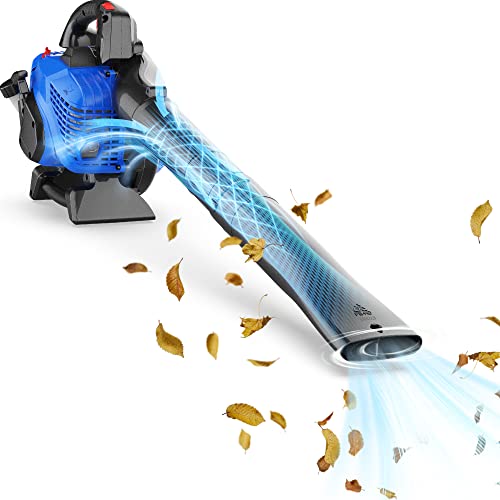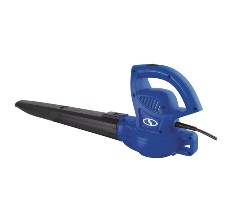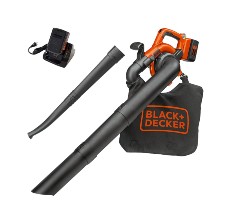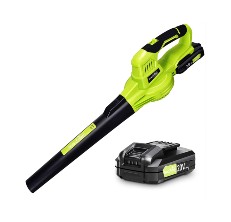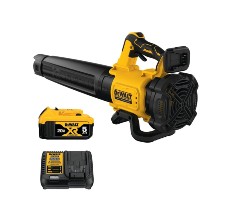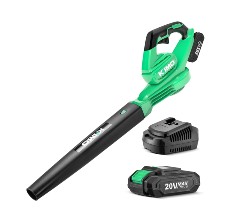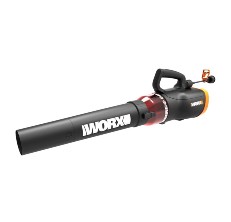As beautiful as colorful autumn leaves look, they always end up leaving our yards looking quite messy. Thankfully, we have the perfect solution to this problem: a leaf blower. The major function of a leaf blower is to displace fallen leaves, although you can use them for cleaning up snow, drying your car, or cleaning your gutter as well. Our team of researchers considered factors like weight, power source, portability, and noise level and found the best leaf blower option to be the Wild Badger Power Leaf Blower. It has a 2-cycle engine and a dual-layer filter for cleanliness.
Our Top Picks For Leaf Blowers
A Buyer's Guide: Leaf Blowers
It will soon be that time of year again when leaves begin to change color and fall. But leaf blowers can keep your lawn looking pristine all autumn. Searching for the best leaf blower depends on a few key factors. This buying guide will provide you with all the information you need to make an informed decision when searching for a leaf blower.
Different Types of Leaf Blowers
Leaf blowers are usually categorized based on how they are held. The following are the types of leaf blowers that you can expect to find in the market.
Handheld Leaf Blowers
These units are popular among homeowners. They are perfect for small-scale jobs and they pack all essential features in one small unit. Leaf blowers that fall into this category are lightweight and can be handled without using both hands.
Backpack Leaf Blowers
Weighing twice as much as handheld leaf blowers are the backpack leaf blowers, suitable for use in garages and large fields. These leaf blowers can be used for extended periods, and the motor can be carried around either by placing it under your armpits or in a backpack.
Wheeled Leaf Blowers
These leaf blowers, sometimes called walk-behind leaf blowers, offer maximum power. They are used by professionals and are suitable for large-scale jobs. They also pack functions that make them the perfect leaf blowers for large parking lots. One of the few drawbacks with them, however, is that they require constant maintenance.
How Are Leaf Blowers Powered?
When it comes to using your leaf blower, the power source is very important. This will determine how often you will have to fuel or charge your leaf blower and what kind of maintenance they may need.
Gas-Powered Leaf Blowers
One of the most popular ways of powering a leaf blower is by using gasoline and oil. The oil serves to lubricate the engine when the blower is being used.
With a gas leaf blower, you don’t have to worry about the length of the blower cord being too short or the battery running out of juice. These leaf blowers also pack a lot of power in them. These leaf blowers are, however, very loud, and many times they come with many maintenance requirements.
Corded Electric Leaf Blowers
Leaf blowers powered with the aid of a cord are lightweight and they also pack enough power to rival gas-powered leaf blowers. However, movement with leaf blowers in this category is usually restricted by the length of the cord and the tendency for the cord to get tangled up during use.
For this reason, they are best suited for small to medium-sized yards.
Battery-Powered Leaf Blowers
Battery-powered leaf blowers are perfect if you want to escape the hassles of corded electric leaf blowers and gas-powered leaf blowers. Cordless, battery-powered leaf blowers give more mobility while being lightweight.
These blowers are, however, limited by the battery capacity. Most battery-powered leaf blowers offer a use time of only around two hours, after which the battery will need to be recharged. Also, the presence of a battery adds to the weight of the blower.
How To Pick A Leaf Blower
Here are a few factors that you should consider when searching for the best leaf blower.
The Size of the Job
Most often, the size of the job will determine the type of leaf blower that is needed to complete the task with the least amount of time and effort. You’ll need a bigger blower with a long battery life or larger fuel tank for larger areas so it lasts long enough for you to work. Small jobs, like blowing leaves and cleaning the patio, are best handled with the help of portable handheld cordless leaf blowers.
Weight and Portability
The weight and portability of a leaf blower define how comfortable it is to use. If a lightweight machine is important to you, then corded electric leaf blowers are the best option, especially if the task is small.
Also, the portability of the blower relates to how easy it will be to move from its storage space to the place of use. Corded and cordless electric leaf blowers are the most portable leaf blowers available today.
Power Source
You need to determine what power source you want your leaf blower to use. Your selection should be based on the largeness of the task at hand and how far you are from a power outlet. If the job is small, the cordless battery-powered leaf blower is the best. It is lightweight and noiseless.
On the other hand, if the task is a large one that requires a lot of power to blow the leaves, dirt, and debris, then gas-powered leaf blowers are what you need.
Power Rating
Whatever type of leaf blower you pick, ensure you check the power rating before making your selection.
The power rating of a gas leaf blower is usually measured in cubic centimeters, while corded electric leaf blowers are measured in amps. Cordless battery-powered leaf blowers are measured in volts. The higher the rating, the better the performance of the leaf blower.
Air Flow and Airspeed Rating
Another important factor that you must consider in a leaf blower is the airflow rating and airspeed rating. These two factors will determine how efficient your leaf blower is. The airflow rating, usually measured in cubic feet per minute (CFM), refers to the amount of air that the leaf blower can produce. The airspeed rating is equally important. It is measured in MPH, and it refers to the speed of air that comes out of the leaf blower. This speed can also be varied, and you must choose a leaf blower that can deliver air at a fast speed of at least 60mph for small tasks and 120mph for medium to large tasks.
Noise Level
You should also consider the noise level of whichever leaf blower you intend to buy. While battery-powered and corded electric leaf blowers are almost noiseless, gas-powered leaf blowers are noisy machines. These leaf blowers go as high as 100 decibels, while many electric-powered ones are between 60 and 70 decibels.
Before buying a powerful leaf blower, ensure you check with your local authority about the allowed noise limit for leaf blowers.
People Also Asked
How much should I spend on a leaf blower?
The price will depend on the type of blower you intend to get. Backpack leaf blowers cost $250 on average. Handheld leaf blowers cost between $30-$110, while their cordless counterparts cost between $150-$300.
What's more important, MPH or CFM?
When choosing between a combination of MPH and CFM, it's recommended to go for the higher CFM option. While these two criteria are very important, a blower with a higher CFM will blow more leaves than a blower with a high MPH. This is because CFM directly relates to the blower's power, while MPH only refers to the speed at which air comes out of the leaf blower.
How good are electric-powered leaf blowers?
Compared to gas-powered and battery-powered leaf blowers, corded electric leaf blowers are a better option for many. Not only do they have enough power to compete with a gas leaf blower, they also offer silent operations like cordless battery-powered leaf blowers. In addition to this, they are eco-friendly as they do not give off toxic emissions.
Are leaf blowers bad for your health?
Gas leaf blowers pose some health risks as they produce formaldehyde, benzine, and smog-causing particles, which play a big part in causing dizziness, asthma attacks, heart diseases, and even cancer. Always wear proper safety equipment while handling any leaf blower.
How long should a leaf blower last?
A gas leaf blower should last an average of 1000hours with proper maintenance and care. This means regular homeowners will be able to use their gas-powered leaf blowers for up to 10 years.




